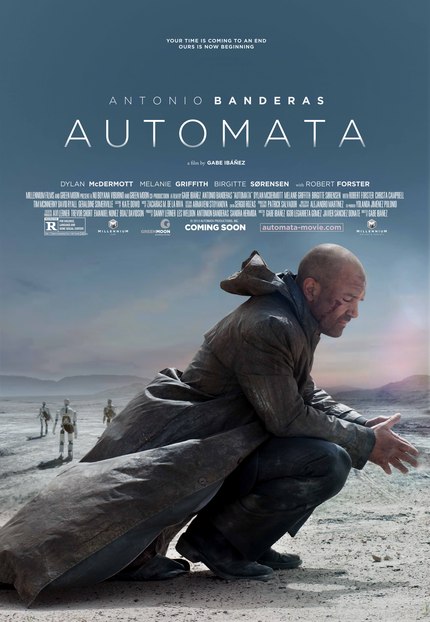Interview: AUTOMATA Director Gabe Ibáñez Talks Banderas, Robots, And The Future

Do you think the human race is doomed?
That wasn't necessarily what I had in mind when I created the landscape of the film. It works for the story, that's the idea in the film, but I don't think we're going in that direction. So much of what you see in the film, though, is already happening. In different places, violence, environmental problems. It might not be as bad as in the film, but it's the kind of landscape that works to explain the conflict in the movie.
What drew you to the story?
It was more about the artificial intelligence. The word 'automatize' refers to the first robots created, 30 or 40 years ago, trying to create a form of life. From a philosophical point, to me, it's more interesting and strange to talk about artificial intelligence. Maybe we will create one, in the future. Humans have biological limits, our evolution is very slow, but an artificial intelligence doesn't have this limitation, it can grown and evolve much more quickly. That concept is startling.
How did you envision Jacq, Antonio Banderas' character? What kind of person did you want him to be?
We wanted him to be a kind of anti-hero. We love the Western anti-hero, also the kind from film noir. Someone very small and grey that begins this big investigation. Jacq is afraid to have a baby in this world, and is not interested at first in fighting for this world, but he changes. It's not exactly how the character was in the script; we worked with Antonio and made some changes. He brought a little bit of light to him.
Javier Bardem voices one of the robots, though his name isn't in the credits.
This movie was a miracle to make, it was hard to raise the money. Antonio was a big help, he called in Javier as a personal favour to him.
The first half of the film has a very noir feel, with rainy streets and crime, very American. The second half feels almost like an Antonioni film.
From the beginning, we knew that the film was going to have two very different parts. We shot them differently, with different frames and types of lighting. Even the characters work differently in the two halves. These are two different worlds. The first, as you say, has more noir references. The second is stripped down, fewer references, more like a twilight Western. My friend Nacho [Vigalondo] says it works like two different movies, and I did have more control over the second half, which I prefer.
How did you want to convey the evolution of the robots? How did you want to represent that significance?
I wanted them to be very empathetic. The audience needs to empathize with them and see them in a positive light. We wanted to show that, if this artificial intelligence is life, then it is a different kind of life, but that is not a bad thing. We worked on this balance; we wanted you to see something of a human in them, hence the outer masks, so that the audience will care about the robots. But then there are some without the human mask cover, because it is a different life form. That might be stranger for a human to see, because it is less human, but it is more the robot's face. Their faces and voices will necessarily be different.
There is some strange religion that humans are now following, in the dying world. What did you want to portray about humans and their new beliefs?
We saw it as a prayer-apocalyptic movie. The idea is that we create a society at the limit of the world, where all that is left are there religious beliefs, or superstitions. But more of the classical religions, something that the robots adapt. At the end, we come back to the origins, it's almost a regression in thought. Religion and mythology are impossible to avoid. When technology disappears, or cannot help us anymore, then religion will reemerge.

Do you feel this content is inappropriate or infringes upon your rights? Click here to report it, or see our DMCA policy.






